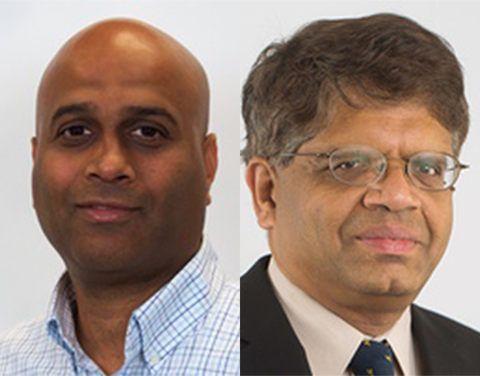Shenoy, Sitaraman Named Asia-Pacific Artificial Intelligence Association Fellows

Distinguished Professors Prashant Shenoy and Ramesh Sitaraman of the Manning College of Information and Computer Sciences (CICS) at UMass Amherst have recently been named fellows of the Asia-Pacific Artificial Intelligence Association (AAIA).
Incorporated in Hong Kong in 2021, the AAIA is an academic, non-profit organization that aims to enhance the development and application of artificial intelligence by scientists around the world through academic research, academic exchanges, science education, science exhibitions, academic conferences, academic publications, and other activities.
Prashant Shenoy, the associate dean of computing and facilities in CICS, is known for his work on the automatic scaling of web services under heavy loads, as well as his work to decarbonize distributed systems and physical infrastructure through computational approaches.
Shenoy’s research focuses broadly on distributed systems and networking with current projects in cloud computing, green computing, and energy informatics. He directs the Center for Smart and Connected Society and the Laboratory for Advanced and Software and is the former director of the Center for Personalized Health Monitoring. He is the founder and co-chair of ACM SIGEnergy, a professional group focusing on energy informatics and computational sustainability.
“Our research sits at the intersection of computing systems and AI with the goal of improving efficiency,” says Shenoy. “For example, our work has examined how to make AI workloads in the cloud more sustainable and how to make edge AI more adaptive and resource-efficient.”
Shenoy is a fellow of the ACM, IEEE, and AAAS. He received an ACM SIGMETRICS Test of Time Award in 2016 and was named a 2017-2018 Fulbright Specialist Scholar. At UMass Amherst, Shenoy is a recipient of a Samual F. Conti Fellowship and a three-time recipient of the UMass President's Office Science and Technology Fund Award. He holds a doctorate and a master's degree in computer science from the University of Texas at Austin and a bachelor's degree in computer science and engineering from the Indian Institute of Technology, Bombay.
Ramesh Sitaraman is the associate dean for educational programs and teaching at CICS. He is best known for pioneering content delivery networks (CDNs) and edge computing services that currently deliver much of the world’s web, videos, edge applications, and online services. As a principal architect, he helped create the Akamai network, the world’s first major content delivery network (CDN) and edge computing service. He retains a part-time role as Akamai’s chief consulting scientist.
Sitaraman’s research spans all aspects of Internet-scale distributed systems, including algorithms, architectures, performance, and energy efficiency. Recently, his research has focused on intelligent systems that learn and adapt to the ever-changing environments in which they operate.
“AI has become an indispensable tool for building intelligent systems that can automatically tune themselves to achieve optimal performance without human intervention,” says Sitaraman. “For instance, we have recently developed a cache management system that automatically learns the optimal caching policy for its specific user access pattern and its mix of content types.”
Sitaraman is a fellow of the ACM and IEEE. In recognition of his work on BOLA, a widely used adaptive bitrate algorithm, he received the 2018 Excellence in DASH award and the 2023 IEEE William R. Bennett Prize. He received the inaugural ACM SIGCOMM Networking Sytems award for his work on the Akamai CDN and is a recipient of the UMass Amherst Distinguished Teaching Award, the university’s highest recognition for teaching, as well as the College Outstanding Teaching Award. He received a bachelor’s degree in electrical engineering from the Indian Institute of Technology, Madras, and a doctorate in computer science from Princeton University.
For more information about the AAIA and a complete list of fellows, visit aaia-ai.org.